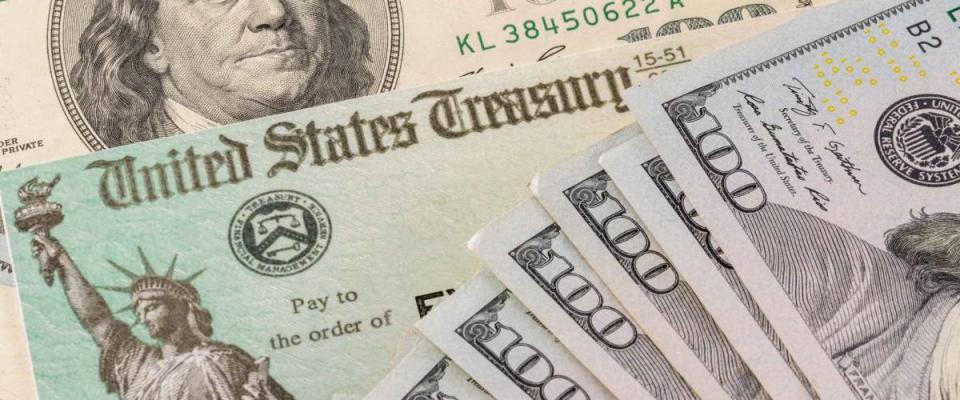The amount of your third stimulus check can be a surprise — good or bad

A day after Congress gave final approval, President Joe Biden on Thursday signed his $1.9 trillion COVID relief package — which includes stimulus checks of up to $1,400 that Biden says will go to 85% of American households.
If you need more cash to pay down debt, save or cover household expenses, you may have it very quickly.
"People can expect to start seeing direct deposits hit their bank accounts as early as this weekend," White House Press Secretary Jen Psaki said during a briefing.
But once these third direct payments begin to arrive, you may be surprised by what you receive — or don't get — this time.
Who will be pleasantly surprised by their stimulus checks?

Many families will collect more money this time to use however they like, whether for essentials like rent or groceries, or to spend on other needs like affordable life insurance to provide financial protection for family members.
For the first time, households will get payouts for older dependents, including high school and college students over the age of 16. They'll earn you another $1,400 each. The same goes for disabled adult and elderly dependents.
And, qualifying parents will receive the full $1,400 for their young children. Last year's very first stimulus checks offered just $500 each for little ones.
Here's another reason you may be pleased with the new payments: The IRS bases your eligibility for stimulus checks on your most recent income tax return. If you were previously a high earner but your income dropped enough in 2020 to make you eligible for some cash, you can get it.
If you’ve already filed your taxes, or if you hustle to get your return in ASAP, the IRS will be able to use the reduced income from your 2020 tax return to give you a full or partial payment.
Who will be unpleasantly surprised?

The third stimulus checks were originally meant to follow similar income guidelines as the two earlier payments, but the U.S. Senate made a change designed to "target" the new relief toward needier Americans.
As before, anyone with adjusted gross income under $75,000 (or $150,000 for couples) will receive a full payment. Then, the amounts start to phase out — and cut off completely at incomes above $80,000 (or $160,000 for couples). Previously, there was money for taxpayers making up to $100,000 (and $200,000 for couples).
That means if you're an individual earning $85,000, you would have gotten at least a partial payment from the last two rounds of stimulus checks. This time, you get nothing.
Some households that had a good year in 2020 may be able to avoid this fate by waiting to file their taxes. If your income from 2019 would entitle you to a full or partial payment, but not your income from last year, sitting on your 2020 return will allow the IRS to use your 2019 taxes as the basis for your stimulus check.
Remember, you have until April 15 to file your 2020 tax return. The IRS could begin distributing money as early as next week, meaning you should have plenty of time to ensure you qualify for stimulus money before you have to submit your return.
What if you’re completely left out of a stimulus check this time?

About 6.5 million households that received the last two stimulus payments won’t qualify for money in this go-round, according to an estimate from the nonpartisan Tax Foundation.
If you're not eligible but you need money, like, yesterday, there are a few things you can do to find some extra funds in your budget.
Cut the cost of your debt. If you’ve been leaning hard on credit cards through the pandemic, you’re probably piling up lots of costly interest. There’s a better way. Make your debt easier to carry — and unload sooner — by folding your balances into a single debt consolidation loan at lower interest.
Reduce your mortgage payments by refinancing your mortgage. If you haven’t looked around for a lower interest rate on your home loan in the last year, what are you waiting for? Rates are still historically low, and refinancing your home loan could reap big savings. Millions of homeowners still have the potential to cut their monthly payments by hundreds of dollars through a refi.
Slash your insurance bills. Car insurance companies have been handing out discounts to drivers sticking close to home because of COVID. If yours won’t budge, then maybe it’s time to shop around for a better deal. You also could also save hundreds on your homeowners insurance by comparing rates to find a lower price.
Trim your budget and "make your own" stimulus check. By finding a few creative ways to cut back, you might easily give yourself another $1,400. Scale back on the takeout and have a homemade pizza night instead. Have a hobby or special talent? Turn it into a side gig to bring in extra income. And, download a free browser extension that will automatically hunt for better prices and coupons whenever you buy online.

